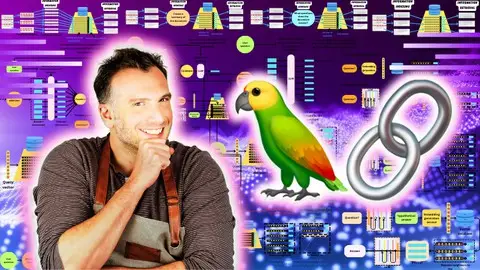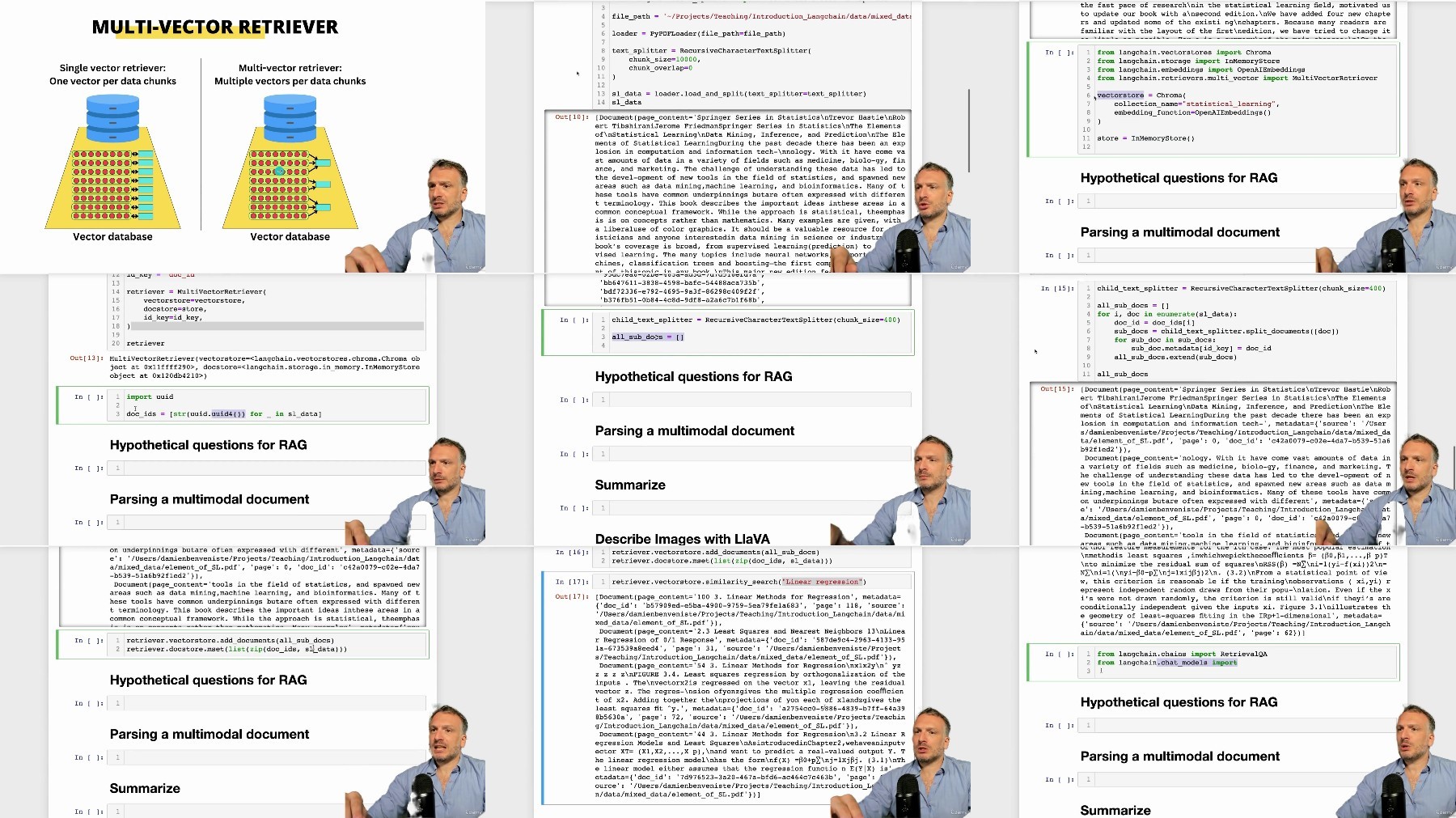Introduction To Langchain

Introduction To Langchain
Published 11/2023
MP4 | Video: h264, 1920x1080 | Audio: AAC, 44.1 KHz
Language: English
| Size: 6.29 GB[/center]
| Duration: 7h 21m
Learn to build Software Applications with Large Language Models
What you'll learn
Build software applications with Large Language models
Learn how to augment LLMs with tools and databases
Learn how to connect LLMs to external data
Learn the fundamentals of Prompt Engineering
Learn the fundamentals of Vector Databases
Learn the fundamentals of Retrieval Augmented Generation
LangChain: Models, Chains, Prompts, Memory, Vector stores, Agents!
Requirements
Python
Jupyter notebooks
VS Code
Description
Welcome to the Introduction to LangChain course! Very recently, we saw a revolution with the advent of Large Language Models. It is rare that something changes the world of Machine Learning that much, and the hype around LLM is real! That's something that very few experts predicted, and it's essential to be prepared for the future.LangChain is an amazing tool that democratizes machine learning for everybody. With LangChain, every software engineer can use machine learning and build applications with it. Prior to LangChain and LLMs, you needed to be an expert in the field. Now, you can build an application with a couple of lines of code. Think about language models as a layer between humans and software. LangChain is a tool that allows the integration of LLMs within a larger software.Topics covered in that course:LangChain BasicsLoading and Summarizing DataPrompt Engineering FundamentalsVector Database BasicsRetrieval Augmented GenerationRAG Optimization and Multimodal RAGAugmenting LLMs with a Graph DatabaseAugmenting LLMs with toolsHow to Build a Smart Voice AssistantHow to Automate Writing NovelsHow to Automate Writing SoftwareThe course is very hands-on! We will work on many examples to build your intuition on the different concepts we will address in this course. By the end of the course, you will be able to build complex software applications powered by Large Language Models!
Overview
Section 1: Introduction
Lecture 1 Introduction to the course
Lecture 2 Course structure
Lecture 3 Setting up your Jupyter Notebook (optional)
Section 2: LangChain Basics
Lecture 4 Introduction
Lecture 5 What is LangChain - OpenAI API Key - Installing the Python Packages
Lecture 6 LLMs
Lecture 7 Chains
Lecture 8 Prompt Templates
Lecture 9 Output parsers
Lecture 10 Simple Sequence
Lecture 11 Written material
Lecture 12 Outro
Section 3: Loading and Summarizing Data
Lecture 13 Introduction
Lecture 14 Loading Data
Lecture 15 Summary strategies
Lecture 16 Summarization examples
Lecture 17 Written material
Lecture 18 Outro
Section 4: Prompt Engineering Fundamentals
Lecture 19 Introduction
Lecture 20 Elements of a Prompt
Lecture 21 Few-Shot Learning
Lecture 22 Memetic Proxy
Lecture 23 Chain of Thought
Lecture 24 Self-Consistency
Lecture 25 Inception
Lecture 26 Self-Ask
Lecture 27 ReAct
Lecture 28 Plan and Execute
Lecture 29 Written material
Lecture 30 Outro
Section 5: Vector Database Basics
Lecture 31 Intro
Lecture 32 Why Vector Databases?
Lecture 33 Similarity Metrics
Lecture 34 Why do we need Indexing?
Lecture 35 Product Quantization
Lecture 36 Locality Sensitive-Hashing
Lecture 37 Navigable Small World
Lecture 38 Hierarchical Navigable Small World
Lecture 39 Maximum Marginal Relevance
Lecture 40 Written material
Lecture 41 Outro
Section 6: Retrieval augmented generation
Lecture 42 Introduction
Lecture 43 Indexing data
Lecture 44 Loading data into a vector database
Lecture 45 Providing sources
Lecture 46 Indexing a website
Lecture 47 Indexing a GitHub repository
Lecture 48 The Stuff Strategy
Lecture 49 The Map-Reduce Strategy
Lecture 50 The Refine strategy
Lecture 51 The Map-Rerank strategy
Lecture 52 Written material
Lecture 53 Outro
Section 7: RAG optimization and Multimodal RAG
Lecture 54 Introduction
Lecture 55 Multi-Vector Retriever
Lecture 56 Hypothetical Queries
Lecture 57 Parsing a Multimodal Document
Lecture 58 Summarizing the Data
Lecture 59 Describing Images with LlaVA
Lecture 60 Index the Data into a Database
Lecture 61 Finalizing the RAG Pipeline
Lecture 62 Written material
Lecture 63 Outro
Section 8: Augmenting LLMs with a Graph Database
Lecture 64 Intro
Lecture 65 What is a Knowledge Base
Lecture 66 Getting the Data
Lecture 67 Create the Graph Representation
Lecture 68 Augmenting LLMs with a Knowledge Base
Lecture 69 Using the Diffbot Graph Transformer
Lecture 70 Creating a Local Graph Database
Lecture 71 Augmenting an LLM with the Graph Database
Lecture 72 Written material
Lecture 73 Outro
Section 9: Augmenting LLMs with Tools
Lecture 74 Intro
Lecture 75 What is an Agent?
Lecture 76 Agent Example
Lecture 77 Dissecting the Iterative Process
Lecture 78 The Different Tools
Lecture 79 Building Custom Tools
Lecture 80 Written material
Lecture 81 Outro
Section 10: How to build a Smart Voice Assistant
Lecture 82 Introduction
Lecture 83 What are we building
Lecture 84 Setting up the Project
Lecture 85 From Speech to Text
Lecture 86 From Text to Speech
Lecture 87 Building a Conversational Agent
Lecture 88 Augmenting the Agent with Tools
Lecture 89 Written material
Lecture 90 Outro
Section 11: How to Automate Writing Books
Lecture 91 Introduction
Lecture 92 Formalizing the Book Writing Process
Lecture 93 Setting up the Project
Lecture 94 The Main Character
Lecture 95 The Title
Lecture 96 The Plot
Lecture 97 The Chapters List
Lecture 98 The Events List
Lecture 99 The Chapters' Plots
Lecture 100 Writing the Book
Lecture 101 Writing to File
Lecture 102 Reading the Book
Lecture 103 Written material
Lecture 104 Outro
Section 12: Automating Writing Software
Lecture 105 Introduction
Lecture 106 The Strategy
Lecture 107 Setting up the Project
Lecture 108 The Technical Requirements
Lecture 109 The Class Structure
Lecture 110 The File Structure
Lecture 111 The File Paths
Lecture 112 The Code
Lecture 113 Iterate
Lecture 114 Written material
Lecture 115 Outro
Section 13: Thank you!
Lecture 116 Parting words
Intermediate Python developers curious to learn how to develop software applications with Large Language Models,Machine Learning enthusiasts that want to to improve their knowledge on Large Language Models

https://fikper.com/IWGYXDjXam/.Introduction.to.LangChain.2023-11.part1.rar.html
https://fikper.com/DVlXd8GNud/.Introduction.to.LangChain.2023-11.part2.rar.html
https://fikper.com/BOGpK0ietU/.Introduction.to.LangChain.2023-11.part3.rar.html
https://fikper.com/JjS5oobiUF/.Introduction.to.LangChain.2023-11.part4.rar.html
https://fikper.com/dVln3hImJq/.Introduction.to.LangChain.2023-11.part5.rar.html
https://rapidgator.net/file/73eaf7017bf77664252a72cfc076465d/.Introduction.to.LangChain.2023-11.part1.rar
https://rapidgator.net/file/140e8b4033524df3ea55ec771f885a2d/.Introduction.to.LangChain.2023-11.part2.rar
https://rapidgator.net/file/ded5baa43349b14c42487e85533f4d03/.Introduction.to.LangChain.2023-11.part3.rar
https://rapidgator.net/file/0982ad67fb992393424a584764ec3e69/.Introduction.to.LangChain.2023-11.part4.rar
https://rapidgator.net/file/9dd6ff8141461467350c06b91e3548c4/.Introduction.to.LangChain.2023-11.part5.rar

https://katfile.com/c4okji59k4xk/.Introduction.to.LangChain.2023-11.part1.rar
https://katfile.com/7ac05t2mqort/.Introduction.to.LangChain.2023-11.part2.rar
https://katfile.com/f1nyiuar5kbs/.Introduction.to.LangChain.2023-11.part3.rar
https://katfile.com/ob7ay9ewgyrz/.Introduction.to.LangChain.2023-11.part4.rar
https://katfile.com/k5u8e17jx207/.Introduction.to.LangChain.2023-11.part5.rar
Free search engine download: Udemy - Introduction to LangChain 2023-11
